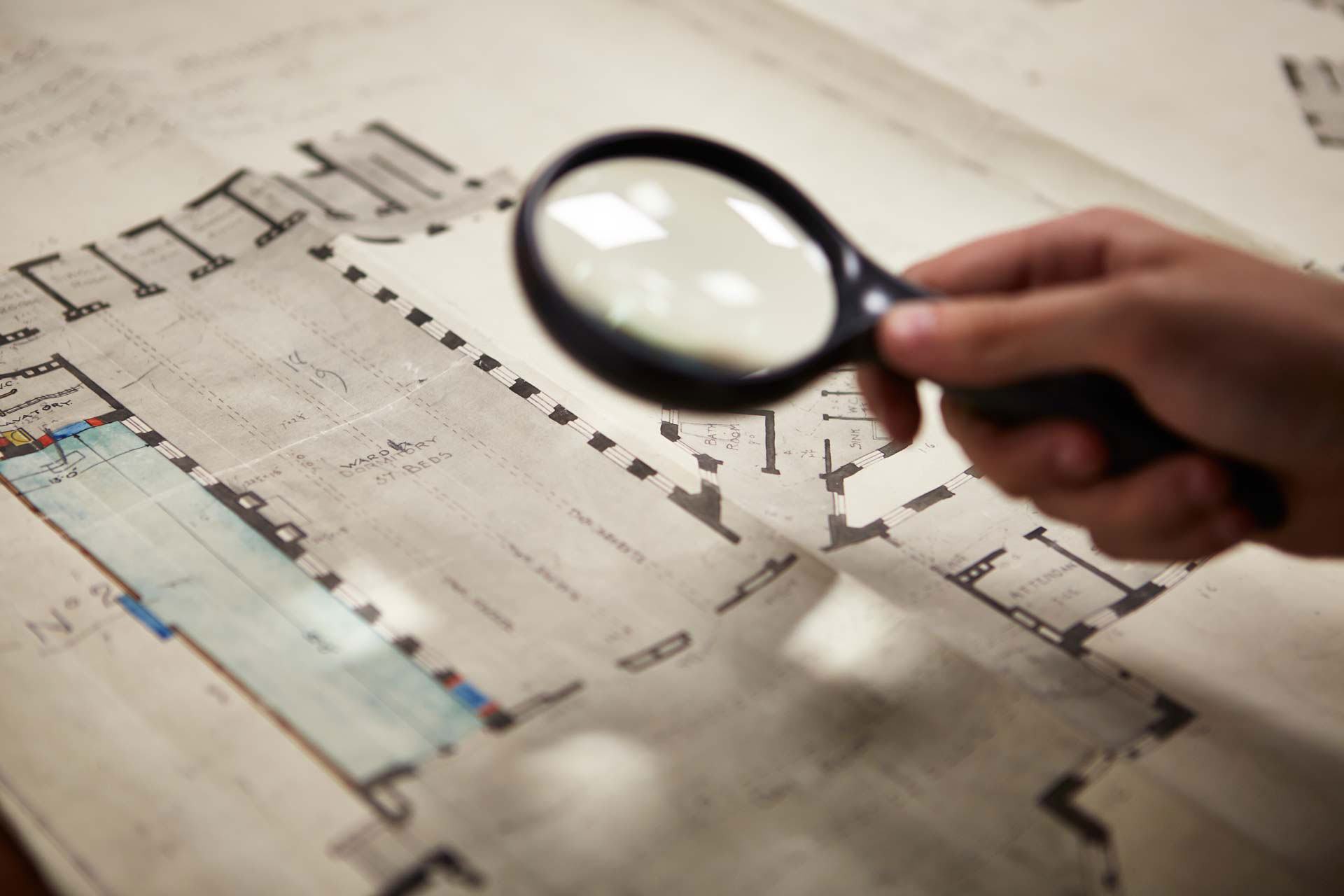
Start date
22 September 2025
Duration
3 years full-time
4 years inc. placement year
5 years part-time
Places available (subject to change)
50
About the course
Reasons to study
- History at Huddersfield is ranked 9th in the UK in the Guardian League Tables 2025
- The option to undertake a work placement in the UK could introduce you to a range of graduate prospects.
- You’ll have the chance to explore the award-winning archive at Heritage Quayâ¯and the Holocaust Centre North on campus.
Keen to study history at degree level? History at Huddersfield is ranked 9th in the UK in the Guardian League Tables 2025 and 9th in the Daily Mail University League Tables 2024.
Studying history enables us to put ourselves and our societies into perspective, establishing connections between the events, ideas and people that built past and present worlds. Here in Huddersfield, you’ll develop your critical thinking and writing through the handling of primary sources and the material culture of the past, learning to become an independent researcher.
Nestled in the centre of historic Yorkshire, our course engages with both local heritage and international histories.It covers a range of eras, from the medieval and early-modern period to the modern world, and inspires you to make historical connections with contemporary global challenges.
Why study History BA(Hons)
We believe that students perform best in coursework and so there are no exams on our History course.Instead, we’ve carefully designed a first-year programme to give you strong foundations in the handling of sources, texts and artefacts from the medieval, early modern and modern period.You will then hone your skills and knowledge in a series of options in year two and three, including an independently supervised project and gain valuablework experience on our placement module, which you can complete alongside your studies or as a five-week block. An optional year-long placement, after the second year could also boost your graduate employment prospects.
During your studies, we encourage you to get creative and apply your historical learning to a range of outputs: among other things, you’ll have the opportunity to engage with history in a variety of ways including analysing a museum exhibition or working on your own piece of oral history. You’ll also benefit from behind-the-scenes access to our innovative and award-winning archive at Heritage Quay and to the unique collections at the Holocaust Centre North.
You could join the student History Society, too, and organise trips, debates and social events to enhance your studies before heading out into the world and into your first role.
Our course gives you a range of skills, including good communication and analytical skills, independence and team working, and problem solving. You will also develop skills in management, research, and planning.
Following your studies, you may wish to head into post-university employment or further your education in, for example, modern history, ancient history, medieval history, British history, or another related area.
Course detail
Core modules:
Twentieth Century Britain
The module combines a chronological and thematic approach to introduce you to the major political, social, economic and cultural developments affecting British society in the 20th century. It places Britain into a global perspective, examining the international and imperial connections which shaped Britain’s interactions with the world. Through this you will examine how these global interactions helped shape a sense of the British self.
The Modern World
Critical Thinking
Sources and Approaches:1400-1700
Core modules:
Work Experience Placement
You will be expected either to complete a graduate or professional level work placement – or, as an alternative an enterprise or citizenship project with a tangible end product (e.g. feasibility study for turning hobby/idea into a personal business or setting up campaign group/developing volunteering/charity initiative) plus associated documentation – plus a self-reflective evaluation of the process. In preparation for this you will undertake career planning and placement research, supported by workshops and tutorial meetings.
Holy Wars: The Age of Crusades
Hitler's Germany: Life and Death in the Third Reich
Refugees in Modern World HIstory
Option modules:
Choose two from a list which may include:
Reformation and Revolution
In this module you will focus on the period 1485-1660, mainly on England, and will examine changes in religious practice and belief, social structure and the development of royal power, especially in terms of central policy and its effects on the localities. You will explore the dramatic religious, social and political changes of the Tudor and Stuart era.
Growing Up in the Past: Oral Histories of Childhood and Youth
From Spoken Work to Searchable Data
Arts and Humanities Placement
The placement year is your chance to gain hands-on experience and build on the skills you’ve developed in your first two years of study. You’ll spend up to 48 weeks (minimum 36 weeks) in a graduate-level role, sharpening your professional skills, exploring career options, and boosting your future job prospects. During your placement, you'll reflect on your performance, develop real-world skills, and learn to approach your role with a critical eye. Your placement will be monitored, and you’ll be assessed on your achievements, setting you up for success in your final year and beyond.
Core modules:
Dissertation
This module is the culmination of your degree, allowing you to apply your skills and knowledge to researching and writing an extended piece of work on a subject of your choice, including, if applicable a public engagement output with an external organisation, such as a museum, archive, community heritage group or similar.
The Great War: Culture and Society
The Dark Years, 1940-1944: Collaboration, Resistance and Memory in Wartime France
Option modules:
Choose two from a list which may include:
Henry's Empire
In this module you will study a key era of early modern history with a strong focus on primary materials and the way in which they relate to key historiographical debates.
Making the Peace: 1918-1924
The Elizabethan Age
The Body and the City
Voices of the Holocaust
An average 14.8%* of the study time on this course is spent with your tutors (either face to face or online) in lectures, seminars, small group tutorials and workshops. You will also have opportunities for individual tuition. Some of your submissions may involve producing a podcast, contributing to an exhibition or working on an archive. The assessment of this module will be based on both written and practical work including essays, oral presentations, research analysis reports and portfolios.
*based on 23/24 programme specifications.
Your module specification/course handbook will provide full details of the assessment criteria applying to your course.
Feedback (either written and/or verbal) is normally provided on all coursework submissions within three term time weeks – unless the submission was made towards the end of the session in which case feedback would be available on request after the formal publication of results. Feedback on exam performance/final coursework is available on request after the publication of results.
Full-time or part-time study
You can choose to study this course on a full or part-time basis. Our part-time students attend modules at the same time as our full-time students, alongside the standard full-time timetable.
Further Information
The teaching year normally starts in September with breaks at Christmas and Easter, finishing with a main examination/assessment period around May/June. Timetables are normally available one month before registration.
Your course is made up of modules and each module is worth a number of credits. Each year you study modules to the value of 120 credits, adding up to 360 credits in total for a bachelor’s qualification. These credits can come from a combination of core, compulsory and optional modules but please note that optional modules may not run if we do not have enough students interested.
If you achieve 120 credits for the current stage you are at, you may progress to the next stage of your course, subject to any professional, statutory or regulatory body guidelines.
-
The University of Huddersfield has been rated Gold in all three aspects of the Teaching Excellence Framework (TEF) 2023. We were the only university in Yorkshire and the Humber and the North West to achieve Gold ratings in all three aspects of the TEF among those announced in September 2023. In fact only 13 Universities, out of the 96 that were announced in September 2023, were Gold in all three ratings.
-
Our teaching staff rank first in England for the proportion with higher degrees and teaching qualifications, as well as being top five for those holding doctorates (HESA 2025). So you’ll learn from some of the best, helping you to be the best.
-
We are joint first in the country for National Teaching Fellowships, which mark the UK’s best lecturers in Higher Education, winning a total of 23 since 2008 (2024 data).
-
We won the first Global Teaching Excellence Award, recognising the University’s commitment to world-class teaching and its success in developing students as independent learners and critical thinkers (Higher Education Academy, 2017).
Read more about academic staff at the University of Huddersfield
At Huddersfield, you'll study the Global Professional Award (GPA) alongside your degree* so that you gain valuable qualities and experiences that could help you to get the career you want, no matter what your field of study is. On completion of the Award, you'll receive a GPA certificate from the University of Huddersfield, alongside the specialist subject skills and knowledge you gain as part of your degree, which may help to set you apart from other graduates.
Giving students access to the Global Professional Award is one of the reasons the University won ‘Best University Employability Strategy’ award at the National Graduate Recruitment Awards 2021. Find out more on the Global Professional Award webpage.
*full-time, undergraduate first degrees with a minimum duration of three years. This does not include postgraduate, foundation, top-up, accelerated or apprenticeship degrees.
Entry requirements
BBB-BCCat A Level . |
120-104 UCAS tariff points from a combination of Level 3 qualifications. |
Merit at T Level. |
DMM-MMM in BTEC Level 3 Extended Diploma. |
|
Offers will be subject to an interview, after which you will be invited to attend an Applicant Visit Day, at which you will have the opportunity to meet staff and current students. Read more about the interview process on our Interviews, auditions and portfolio pages.
If your first language is not English, you will need to meet the minimum requirements of an English Language qualification. The minimum for IELTS is 6.0 overall with no element lower than 5.5, or equivalent. Read more about the University’s entry requirements for students outside of the UK on our International Entry Requirements page.
Other suitable experience or qualifications will be considered. For further information please see the University's minimum entry requirements.
Facilities
Student support
At the University of Huddersfield, you'll find support networks and services to help you get ahead in your studies and social life. Whether you study at undergraduate or postgraduate level, you'll soon discover that you're never far away from our dedicated staff and resources to help you to navigate through your personal student journey. Find out more about all our support services.
Research excellence
Research plays an important role in informing all our teaching and learning activities. Through research, our staff remain up-to-date with the latest developments in their field, which means you develop knowledge and skills that are current and highly relevant.
98% of research produced by History at Huddersfield is internationally recognised, and two thirds of this is internationally excellent or world-leading. Our impact studies, which measure our influence on external partners and organisations, scored particularly highly, being rated 100% internationally excellent or world leading (REF2021). We extend our knowledge and understanding of History through the production of high-quality work, with funding coming from the AHRC, ESRC, the Wellcome Institute, the Leverhulme Trust and other significant grant providers. As part of this process, we have also invested in early career members of staff with great success, including through the Marie-Skłodowska-Curie Actions grants.
History hosts the Research Centre for History, Culture and Memory (CHiCaM), a cross-disciplinary research centre which runs seminars and projects and collaborates with external researchers. Current staff research includes: Richard III and the Princes in the Tower; the history of British humanitarian organisations and peace activism; and the Emily Hobhouse Letters Project. We also host a thriving postgraduate research community, with student joining us from across the world.
For more information, see the Research section of our website.
Important information
Although we always try and ensure we deliver our courses as described, sometimes we may have to make changes for the following reasons





